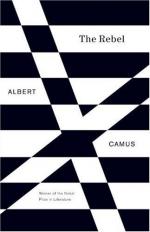
|
| Name: _________________________ | Period: ___________________ |
This test consists of 5 multiple choice questions, 5 short answer questions, and 10 short essay questions.
Multiple Choice Questions
1. According to the ancients referenced in Part 2, what counterbalances negation?
(a) Affirmation.
(b) Power.
(c) Love.
(d) Strength.
2. In Part 3, Bakunin was the only one of his contemporaries to declare war on what?
(a) Literature.
(b) Politics.
(c) Science.
(d) Religion.
3. What problem does Nietzsche's philosophy revolve around?
(a) Nihilism.
(b) Atheism.
(c) Rebellion.
(d) Revolution.
4. In Part 3, what is a "long and painful struggle in the darkness"?
(a) Religion.
(b) Rebellion.
(c) Politics.
(d) Love.
5. According to Part 3, destroying everything pledges oneself to build without what?
(a) Supplies.
(b) Truth.
(c) Foundations.
(d) Religion.
Short Answer Questions
1. According to Part 2's introduction, the "movement by which man protests against his condition and against the whole of creation" is called what?
2. In Part 2, Camus states that the great problem of modern times is the discovery that rescuing man from destiny delivers him to what?
3. According to Saint-Just in Part 3, what is stronger than tyrants?
4. The ancient regime monarchy was founded on what?
5. According to Part 1, remaining silent gives the appearance that one has no what?
Short Essay Questions
1. Why does Camus believe Sade became the first theoretician of absolute rebellion?
2. How does nihilism begin to build a temple of Caesar, according to Camus in Part 3?
3. Why does Camus say the Fascist revolutions of the twentieth century do not deserve the title of a revolution?
4. Why does Camus believe art should provide a final perspective on rebellion's content?
5. Why is it important to Camus to know whether or not people have a right to murder, as outlined in the Introduction?
6. How does Camus define a rebel in Part 1?
7. In Part 5, Camus explains the ambition for the desire for justice is what?
8. According to Camus in Part 5, what is the only way a rebel has of reconciling himself with his act of murder?
9. Why must morality be destroyed, according to Camus in Part 2?
10. In Part 5, Camus says rebels want what to be recognized?
|
This section contains 623 words (approx. 3 pages at 300 words per page) |

|




